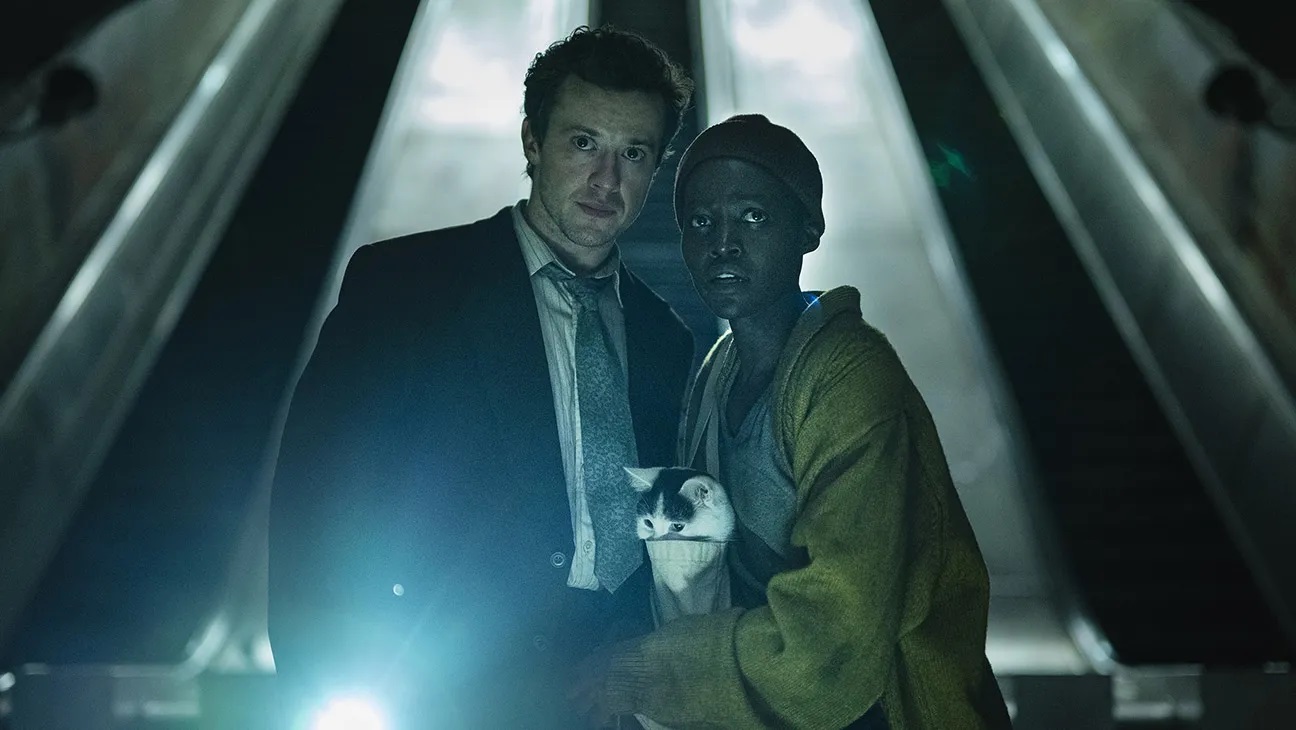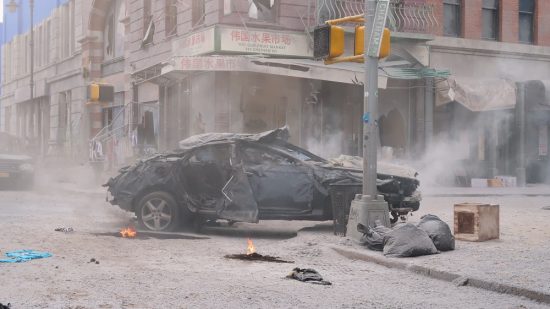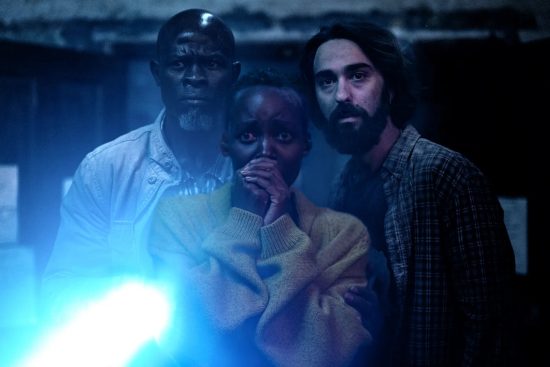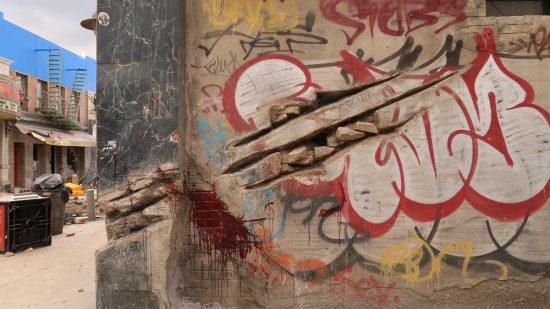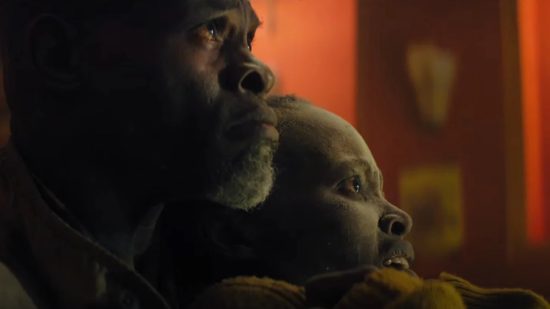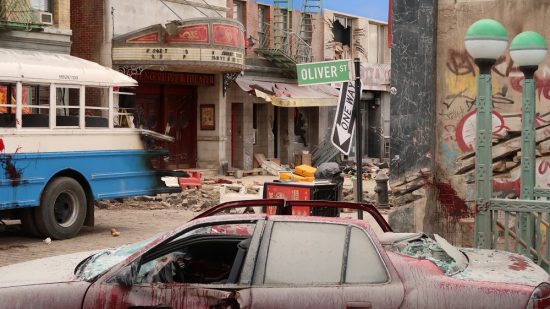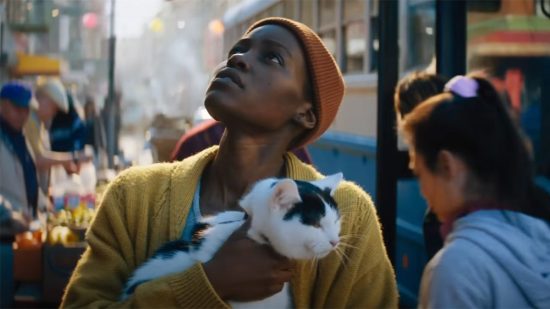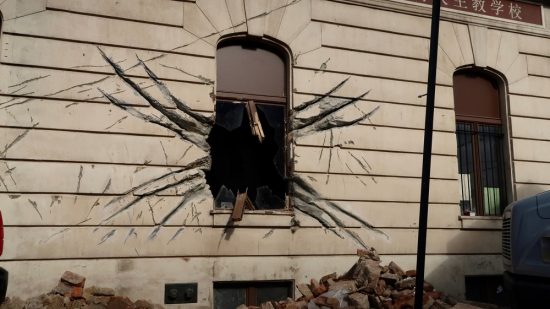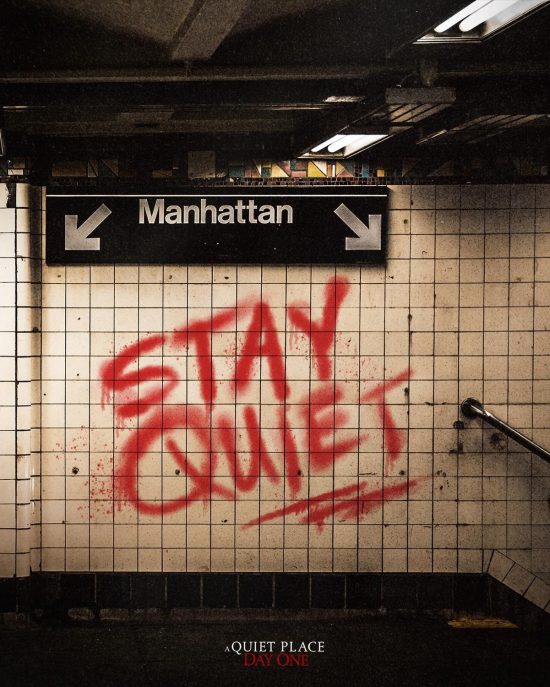Director Michael Sarnoski talks about A Quiet Place: Day One
When John Krasinski was looking for someone to direct the prequel to his A Quiet Place film series, he knew it wouldn’t be a simple search. With its rare combination of tension, character, and spectacle, this is a series of movies that exists in a unique universe – one as emotionally layered as it is rich in popcorn thrills.
In the end, appropriately enough, Krasinski found his filmmaker in the woods. “John had seen a movie I did, called Pig, and he really responded to it,” A Quiet Place: Day One director Michael Sarnoski says of his Nicolas Cage-starring Oregon wilderness tale. “He was really generous and gave me the space to bring what I wanted to.”
Pig won no less than 37 awards on its release in 2021, with Sarnoski lauded by the Directors Guild Of America and the Deauville Film Festival, among many other industry titans. All had been captivated by his ability to mix thrills and heart, to powerful, enthralling effect. That skill set, Krasinski figured, was ideally suited to continuing the legacy of smart horror that audiences everywhere had loved about his signature series so far.
“John was like, ‘Here’s my world. We’re trying to do this New York ‘Day One’ invasion. What’s the story you want to tell in that world?’” Sarnoski remembers of their early conversations.
“The story ended up being unusually intimate. And John was very supportive of going down that path. He gave me a lot of freedom. He wasn’t trying to make this another ‘John’ A Quiet Place movie. He very much wanted to open up this world and hear other voices within it. And he’s very happy with the film.”
Sarnoski was a fan of Krasinski’s first two A Quiet Place movies because of the way they approached epic events through a subjective lens. “I wanted to maintain that. This film is about how these characters are experiencing this event from a boots-on-the-ground perspective,” he says.
Its core premise, of taking the story right back to the start, but this time replacing remote locations with one of the noisiest cities in the world, has resulted in a movie that, Sarnoski says, will more than satisfy fans of the franchise, while also opening up a wider worldview, and larger scale.
“The thing the first movies did so well was circle a family. There was a core family story that the creatures just happened around. The real soul of the film came from the characters and the relationships,” Sarnoski says.
“This is a totally new set of characters. But we’re trying to do the same thing. There is a bunch of big, crazy stuff going on around the city, but the story is very focused on an intimate relationship. It’s fun to see these huge set-pieces paired with these intimate moments. That was one of the core ideas: as the world is ending all around us, how do we find these moments of peace and connection?”
How would you describe A Quiet Place: Day One? What can audiences expect from the movie?
“The core premise is taking A Quiet Place back to the start – doing a ‘Day One’ New York City movie of what [the first attack] looked like in a big, noisy, populated city. And our route into that is focusing on a very strong character story. The thing the first movies did so well was circle a family. There was a core family story that the creatures just happened around. The real soul of the film came from the characters and the relationships. This is a totally new set of characters. But we’re trying to do the same thing. There is a bunch of big, crazy stuff going on around the city, but the story is very focused on an intimate relationship. It’s fun to see these huge set-pieces and then pair that with intimate moments. That was one of the core ideas: as the world is ending all around us, how do we find these moments of peace and connection?”
Tell us about the characters, that main dynamic between Lupita Nyong’o’s Samira and Joseph Quinn’s Eric.
“Lupita’s Samira is returning to a city that once meant a lot to her, having been cut off from the world for a while, wanting to have an adventure. Over the course of her adventure, she meets this stranger played by Joseph Quinn, and a lot of the story is about the two of them navigating what they need from each other, how they’re going to survive together. Eric is seeking someone to bring him calm and safety in the chaos of this world and Samira is attracted to that. She becomes this sort of campfire for him. But she doesn’t want to be that, or agree to that, so they don’t get along very well initially. We’re exploring what people need from each other when the world is falling apart. We also have a cat called Frodo, who is Samira’s cat, and is a big, big character.”
In going back to Day One of this epic franchise, what elements did you want to dig deeper into, when it came to the origin of these deadly creatures?
“It’s always been a balance, because one of the things the previous movies did really well was not oversharing about the creatures and keeping things very focused on the characters’ point of view. I wanted to maintain that. This film is about how these characters are experiencing this event from a boots-on-the-ground perspective.”
How would you describe your creative process with John Krasinski?
“John had seen a movie I did, called Pig, and really responded to it, so he came to me with this project. He was very generous and gave me the space to bring what I wanted to. He was like, ‘Here’s my world. We’re trying to do this New York ‘Day One’ invasion. What’s the story you want to tell in that world?’ The story ended up being unusually intimate. And John was very supportive of going down that path. We talked a lot about the story and characters. But beyond that, he gave me a lot of freedom to go down the path I wanted to. He very much wanted to open up this world and hear other voices within it. It was about finding a balance between the chaos and scares and characters. Keeping it honest. And he’s very happy with the film.”
What can audiences expect from the initial attack by the creatures? How did you achieve that scale?
“We have some very big sequences in the movie, and they were a blast to shoot. We were shooting a movie that takes place in New York, and we shot it completely in London. And we accomplished that through our incredible production designer, Simon Bowles, who built an entire outdoor New York backlot, from the serial killer wall [of Post-It Notes detailing each area] in his office. It was a crazy puzzle box of making this feel like a believable glimpse into New York. We’ve shown this film to New Yorkers and they think it was shot on real street corners. It feels like a living, breathing world that our characters are existing in.”
What are some of your favourite sequences in the film?
“One of the things that A Quiet Place allows for is that the sequences can each have their own identity. Some of ours lead more into the breathless horror side of things, some go full-on action, some are pure tension. As the movie progresses, we get to open things up into what happens when there are thousands of people in the street, trying to save their lives and escape the island. And that inevitably leads to chaos. This New York becomes a real playground of terror, with our characters forced to get into subways that are flooded with water and creatures – all that fun stuff!”
Which other stories did you look to for inspiration when you were prepping this prequel?
“One that came up a lot when I was talking to our cinematographer, Pat Scola, was [Alfonso Cuaron’s dystopian 2006 classic] Children Of Men, which does a great job of portraying a big story told through a very intimate perspective – especially in the action scenes. It feels verite, like you’re on the ground with these characters. For me, where it always comes from is focusing on what our characters are experiencing in this moment.”
What’s your favourite moment from the previous two A Quiet Place movies, and why?
“My favourite scene is probably when John and Emily’s characters [Lee and Evelyn Abbott] are listening to Harvest Moon on an iPod together, dancing, in the first movie. That stuff really works for me. Delivering a baby in a bathtub is extremely intense. But watching these characters who are at the end of the world, fighting every day to survive, have this human connection has so much heart to it. Finding those moments amid this chaos.”
Where does Djimon Hounsou’s character fit into your new movie? We’ve seen him in this world before…
“Yes, we met him in A Quiet Place Part II. He’s on the island they [Cillian Murphy’s Emmett and Millicent Simmons’ Regan] get to at the end. And the initial conception for this film came from the story that Djimon’s character tells [in A Quiet Place Part II], about how he was in New York City when the invasion happened; how people tried to evacuate on boats. I felt it would be redundant to just show the exact story he was telling in that movie in this one, so we’ve told the story of an adjacent character who is there during some of these events we’ve heard about. And [Djimon’s character] plays a really important role for Samira early on. We get to see a little bit of the story he tells [in Part II] and also see that he has already started to take on a bit of the leadership role he has in the second movie.”
The first two movies were about a family. This one is about strangers. What kind of creative opportunities does that give you?
“It gives you a lot of opportunities. The thing that excited me most was that we can all get behind a family protecting each other and caring about each other. But taking two people who don’t really have a reason to care about each other and putting them through horrible situations and watching their relationship grow is an interesting challenge. What does it look like to build a relationship, when it pretty much feels like you’re in the apocalypse? And Lupita and Joseph did an incredible job with that dynamic.”
The A Quiet Place universe has specific internal rules when it comes to the creatures. In what ways have you expanded that mythology?
“Some of that came from talking to John [Krasinski], some from just watching those first two movies multiple times, keeping notes, and figuring out, ‘Okay, so that is how that works!’ There wasn’t a Bible of, ‘Here’s everything you need to know about the creatures and how they operate.’ A lot of this movie is about seeing these creatures in new situations. And we had some leeway to figure out how these creatures communicate and how they work on a larger scale.”
How many creatures are there in this movie?
“This movie implies there are thousands, countless creatures. We happen to be in a hotbed place where a lot of creatures landed. A place that a lot of creatures would be attracted to because New York is an incredibly loud city. It was a balance of trying to convey the sense of what a herd of these creatures is like, while also keeping a sense of mystery. Especially to these characters who don’t know much about these creatures yet. We wanted to maintain the mystery, while also giving a sense of the scale. You feel like they are everywhere.”
The audience this time knows more about these creatures than the characters do. How are you playing with that idea?
“Any time the audience is a step ahead of your characters, it’s an opportunity for suspense. That, ‘No, no, no – don’t do that!’ There’s plenty to play with. The audience wants to experience these characters learning these rules, seeing how people dealt with this event early on. But, at the same time, the audience knows a lot of these rules already. It’s a fine game of showing them exciting things, satisfying that, while also not reiterating the first two films. I think we’ve struck a really nice balance. We’re going to keep everyone on their toes!”
These creatures hunt by sound. The first two movies are set in remote areas. What’s it like when these creatures hit the hustle and bustle of NYC?
“There’s definitely an added element of confusion for the creatures with this new environment they need to navigate. We’re also seeing them early on in their invasion. When we saw them in the second movie, they were more familiar with our world. In this, they’re a little clumsy at times, having to figure out what is and what isn’t something they’re hunting. In New York, there are a lot of sounds to confuse the creatures. But they’re very durable and vicious, so that doesn’t get in their way too much! There are a lot of sounds that are made in the city that our characters need to be both cautious of and utilise for their survival. The city opens up a whole new playground for the creatures. It’s a much more vertical movie. We’re in a city with tall buildings. Now we have skyscrapers for them to play with.”
What kind of NYC noises confuse the creatures?
“We play with what happens when the power goes out in this city. What happens when the generators kick in? This is a city packed with vehicles, cars and alarms. In real life, we’ve seen how when things go wrong in New York, there’s flooding. And with flooding comes rushing water, which is both a danger and possibly something to conceal yourself with.”
This is a franchise that’s synonymous with tension. What’s your favourite scene in this movie, from a tension point of view?
“There’s a sequence in a flooded subway tunnel, where our characters are trying to lose some creatures. I really like that scene because we’re seeing an environment we’re familiar with, but now in this post-apocalyptic way that raises new challenges. And it’s very locked in character. It’s a scene where we see Sam and Eric learn to work together. But we also get a really charged, claustrophobic creature scene in an environment that’s upside down and topsy turvy from how we usually experience it. The threat of drowning and what’s under the water proves a perfect combination…”
A Quiet Place: Day One opens in cinemas on 28th June 2024.

